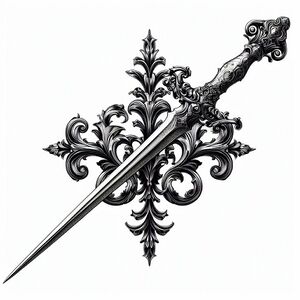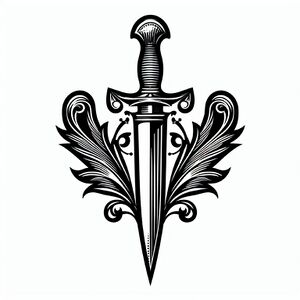Martillien Mafia
This article is a work-in-progress because it is incomplete and pending further input from an author. Note: The contents of this article are not considered canonical and may be inaccurate. Please comment on this article's talk page to share your input, comments and questions. |
 The insignia of the Martilliaen Mafia | |
| Founded | mid 17th century |
|---|---|
| Founding location | Duchy of Martilles modern day |
| Territory | Burgoignesc Metropole, BORA, Daria |
| Ethnicity | Made men are Bergendii, predominantly from Martilles |
| Membership | 737 |
| Leader(s) | Semias Sephiran |
| Activities | Racketeering, drug trafficking, murder, bid rigging, extortion, assault, smuggling, illegal gambling, terrorism, loan sharking, prostitution, money laundering, fencing, robbery |
| Allies | Savatu Brotherhood |
| Rivals | Kiravian Mafia |
The Martillian Mafia, also known as the Ostal Nostre ("Our House"), is a criminal syndicate in Burgundie. It is a loose association of criminal groups that share a common organisational structure and code of conduct. The basic group is known as a "family", "house", or "Ostal". Each family claims sovereignty over a territory, usually a town or village or a neighbourhood (quartier) of a larger city, in which it operates its rackets. Its members call themselves "men of honour", although the public often refers to them as "mafiador". The mafia's core activities are protection racketeering, the arbitration of disputes between criminals, and the organizing and oversight of illegal agreements and transactions.
Etymology
The modern word mafia originated in Burgundie. The Burgones adjective malfiusu (Latin and Imperial Latin: mafioso) roughly translates to mean "doer of harm (sickness)". In reference to a man, mafiusu in 17th century Burgundie was ambiguous, signifying a bully, arrogant but also fearless, enterprising and proud.
The term mafia has become a generic term for any organized criminal network with similar structure, methods, and interests. It is particularly used in Caphiria and Kirav to describe the Savatu Brotherhood and the Kiravian Mafia, respectively.
Iconography


History
Original Ostal Nostre
The Mafia began as an extralegal force in the 19th century, coinciding with Burgundie's transition from feudalism to capitalism. Under feudalism, the nobility owned most of the land and enforced the law through their private armies. After 1865, the feudal barons steadily sold off or rented their lands to private citizens. Primogeniture was abolished, land could no longer be seized to settle debts, and one fifth of the land became private property of the peasants. After Burgundie annexed Martilles in 1866, it redistributed a large share of public and church land to private citizens. The result was a huge increase in landowners — from 2,000 in 1812 to 20,000 by 1867. With this increase in property owners and commerce came more disputes that needed settling, contracts that needed enforcing, transactions that needed oversight, and properties that needed protecting. The barons released their private armies to let the state take over the job of enforcing the law, but the new authorities were not up to the task, largely due to clashes between official law and local customs. Lack of manpower was also a problem; there were often fewer than 350 active policemen for the entire area. Some towns did not have any permanent police force, only visited every few months by some troops to collect malcontents, leaving criminals to operate with impunity in the interim. Compounding these problems was banditry. Rising food prices, the loss of public and church lands, and the loss of feudal commons pushed many desperate peasants to steal. In the face of rising crime, booming commerce, and inefficient law enforcement, property owners turned to extralegal arbitrators and protectors. These extralegal protectors eventually organized themselves into the first Mafia clans.
Great War
Following the bogging down of momentum in the Great War in 1929, the Army of Burgundie sought a number of solutions to break the will of the Derian people. This was equally viewed as a culturally and militarily important objective and no idea was left unexplored. The Imperial Court retired from Cocra to Urceopolis that year as the stalemate made their presence even more contentious. One of the ideas proposed to the high command was the theft of culturally important objects to the identity of all those in Dericania including art, religious relics, Imperial accessories, and small architectural elements. This concept of cultural warfare (theft) was endorsed by the army and occupied areas started to see it implemented at a low level. It was determined that the army was a blunt force instrument and not the right tool for the operation, as well as it being a distraction from the objectives of the soldiers. The task was given to Gendarmerie who attempted to be successful in 1931 but we clumsy in their execution, often causing a scene and angering the citizens of the area. It was determined that it was perhaps better to take these objects in the method of actual theft and the Gendarmerie contracted known cat burglars as a commutation of their sentences. The new tactic went well as the removal of the art couldn't not, ostensibly, be attributed to the Government of Burgundie, but the process was slow and the fact that the burglars were from the prisons of Burgundie meant that they had been caught and therefore where not of the highest caliber. In early 1932, the Martillian Mafia approached the Gendarmerie and offered to plunder the entire kingdom in exchange for payment on the pieces stolen. The Gendarmerie agreed and in the span of two years it is estimated that 30% of the "tangible culture" of the Kingdom of Dericania was removed to Burgundie. It is considered by scholars in the Deric States as the biggest heist in their history.
Modern Ostal Nostre
As the Savatu Brotherhood expanded its drug operation in Burgundie it was clear that they would benefit from a local partner. As organized criminality was on a rapid decline it was clear that a local group would have to be created. The Savatu Brotherhood visited the various criminal groups and found all but one were unable to scale up their operations without becoming a liability. The Delorme Family was approached and asked to reform the Ostal Nostre as a sovereign but a constant ally to the Savatu Brotherhood. They quickly organized a smuggling and distribution ring to help the Savatu Brotherhood expand their criminal empire in Burgundie.
See also
- Pages using duplicate arguments in template calls
- Incomplete articles
- Pages using infobox criminal organization with ethnicity or ethnic makeup parameters
- Pages using infobox criminal organization with rivals parameter
- Organised crime
- Illegal organizations
- Crime
- Burgundie
- Problem Articles
- Burgundie Problem Articles